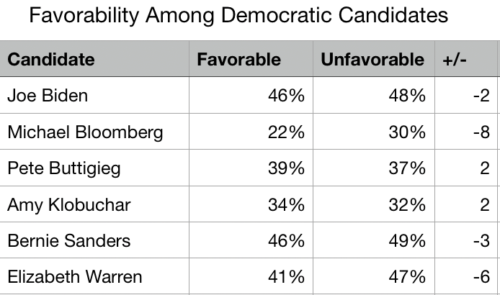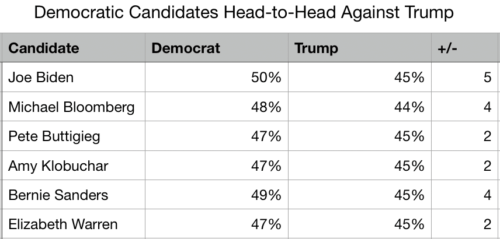Some Democrats don’t like Bernie Sanders, and they’re not shy about expressing it. They think his negative campaigning cost Hillary Clinton the 2016 election. They think his online supporters – the dreaded ‘Bernie Bros‘ – display misogyny, racism, and authoritarian tendencies. But the most common reason – especially as of late – is that they think he’s not electable. He can’t beat Trump, so the story goes, because he’s too divisive, his policies are ‘pie in the sky’ or ‘far left,’ he has skeletons in his closet, and/or he’s too old.
Whew! I’m setting aside the question of the merits of most of these charges. Some, e.g., the one about costing Clinton the 2016 election, we can dismiss as false and widely debunked. Others are more complicated. I’m also setting aside the question of whether Bernie can still win the nomination. Nor is this a post of evangelism. Instead what I’m doing here is addressing the ‘electable’ question. Is Bernie Sanders electable? And how can we tell?
What’s ‘Electable,’ Anyway?
We can’t figure out whether Sanders is electable without knowing how to tell. How do we know whether someone’s electable or not? Do we consult the polls? Measure the candidate’s ideology? Use campaign narratives? Look at how they perform in primaries? How about broad models of presidential politics, like the one Stephen Skowronek uses?
Let’s figure it out.
Some Bad Criteria
I’ll start by ruling a few things out. First, there’s the idea that campaign narratives drive or predict electability. It’s not that these narratives are unimportant. Trump’s narrative as a political outsider shaking up the system and protecting ‘white America‘ from a diverse Democratic Party probably helped him win in 2016. Sadly enough. But the trouble with narratives is that everyone’s got one, and it’s easy to credit those narratives with a victory after the fact. It’s much harder, on the other hand, to use narratives to predict anything about the future.
We say John Kerry was a stiff, milquetoast candidate in 2004 who allowed George W. Bush to ‘Swiftboat‘ him. And we say John McCain would’ve carried out George W. Bush’s third term in 2008. Fair enough. But suppose they had won. With victory in hand, Kerry would’ve been a brave war hero who rescued us from Dubya’s misdeeds in Iraq – ‘help is on the way,’ indeed. And with victory in hand, McCain would’ve been the brave torture survivor who brought a ‘maverick’ approach to presidential politics.
Second, we have broad models, e.g., Skowronek’s. To be clear, I think Skowronek’s work is quite good. It gives us a powerful reading of how presidents fit together in political regimes. But, like narratives, it tells us more about the past than the future. We can diagnose Trump’s presidency after he leaves office, but the Skowronek model can’t tell us now.
Third, we have measures of ideology. Some people try to use those measures to argue that ‘moderates’ are more electable. But the evidence is thin. And the question of who’s a ‘moderate’ is itself politically charged. Getting to any kind of pattern usually requires a sleight of hand, like counting FDR’s four wins separately. With ideology, there’s not much there there.
Some Better Criteria
I’d better start with a confession. There’s no great criterion for figuring out whether someone’s electable. But there are better ones than the ones above. The best predictor is how many voters like the candidate. Go figure.
Hillary Clinton struggled in 2016 in large part because 43% of voters liked her and 55% of voters didn’t. 55% is a very high unfavorable rating. She’d have done worse, but for the fact that voters didn’t like Trump, either. His numbers were 38% favorable and 60% unfavorable. Mitt Romney also struggled with low favorability in 2012.
Second, there’s head-to-head polling against general election opponents. We should be careful here, because polls aren’t highly predictive at this stage. But they do have at least some predictive value starting around 11-12 months before the election, and we’re in that range. And so, it’s OK to use them as a data point.
Third, and most important in any election involving an incumbent, there’s the incumbent’s job approval rating. This will probably be the largest factor determining whether the Democratic candidate can win. The problem? Which candidate the Democrats nominate probably won’t influence it much. The ball’s mostly in Trump’s court.
If Trump’s approval rating is below ~44%, he’ll probably lose to anyone. And if it’s at or above ~48%, he’ll probably beat anyone. This gives us reason not to fret too much about which candidate wins the nomination, insofar as we’re interested in who’s electable. Trump’s numbers are the ones worth watching.
Bernie Sanders vs. Other Candidates
We’ve sorted the wheat from the chaff, and we’ve got our criteria. How does Sanders compare to the other candidates?
Favorability
On favorability, he does OK. In polling averages, 46% of voters like him and 49% don’t. That’s better than Clinton in 2016, but it’s not impressive. A candidate with Sanders’s numbers would’ve beaten Trump in 2016 and would beat him if the election were held today. And some of the people who dislike Sanders – or remain neutral toward his candidacy – are probably supporters of one of his Democratic rivals who will likely move to the Sanders camp if he wins the nomination. And so, there’s reason to believe he has at least some room for improvement. Hillary Clinton’s favorability, for example, improved closer to the election.
Here’s how Sanders stacks up against the other candidates. Yes, I know most dropped out. But it’s good to compare to get a sense of relative standing.

Lots of voters don’t know enough about Bloomberg, Buttigieg, and Klobuchar to decide. When compared to Biden and Warren – the other well-known candidates – Sanders does about the same or a bit better.
Head-to-Head Against Trump
Sanders usually wins in polls against Trump. Polling averages place him at 49% to Trump’s 45%. And so, he wins, but usually not by a lot.
Here’s the comparison to other candidates.

What stands out? Very little. The candidates do almost exactly the same, with Buttigieg, Klobuchar, and Warren perhaps a bit worse than Biden, Bloomberg, and Sanders. But even that’s a questionable inference, especially with Buttigieg and Klobuchar much less well known.
These results are no accident. Trump’s numbers are driving it. As you can see, Trump performs about the same against anyone. Why?
Trump’s Approval Rating
Because of Trump’s approval rating! He polls at 43% approve and 54% disapprove. The people who like him vote for him, and everyone else either votes Democratic or remains undecided. These are the numbers to watch.
As Electable As Anyone Else
The short answer to the question of this post is: Sanders is about as electable as anyone else, and perhaps a tad more electable. The main driving factor behind the winner of the 2020 election will be Donald Trump’s approval rating.
Sanders polls similarly to other candidates, but he does so with a different electoral coalition. Compared to, say, Biden or Bloomberg, Sanders’s voters are: much younger, more Latinx, more progressive, and more enthusiastic. Some sources see these as disadvantages, while other sources see them as advantages. I find neither view particularly well supported.
